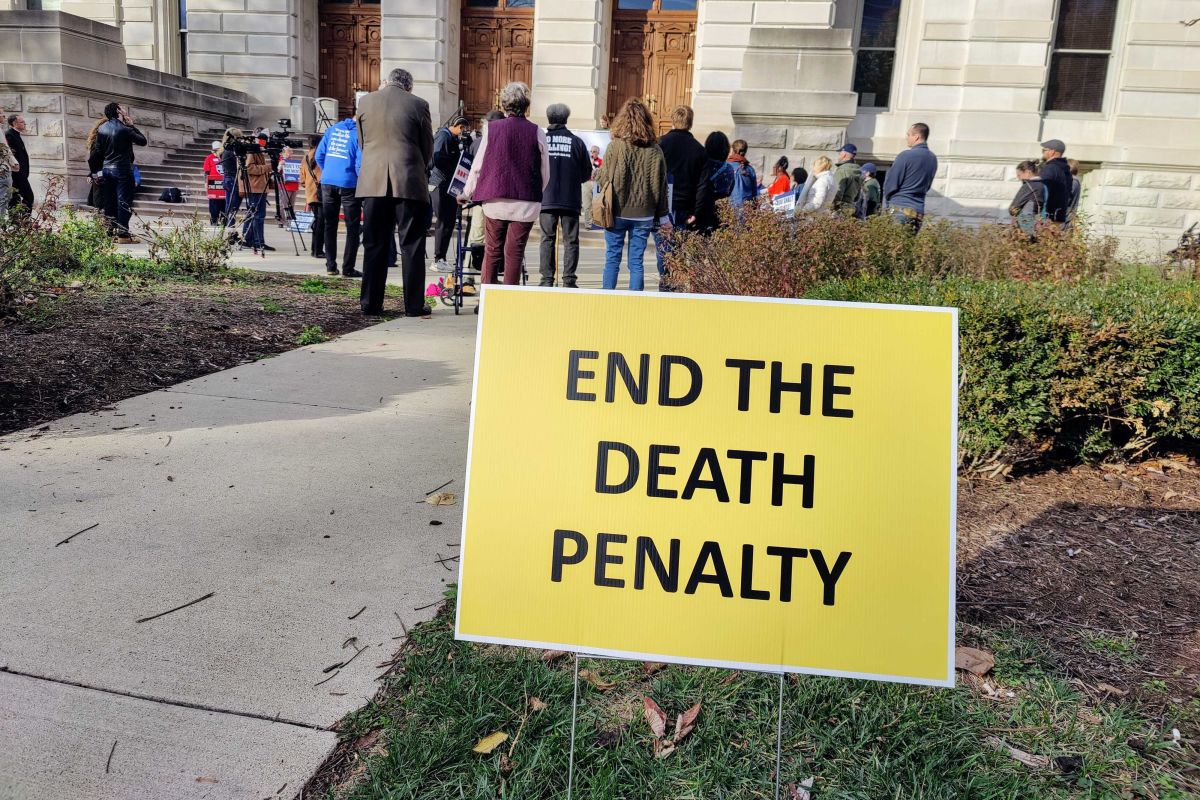
Opponents of the death penalty rallied outside the Indiana Statehouse last weekend. (George Hale / WTIU News)
President-elect Donald Trump’s return to office is putting a spotlight on the U.S. penitentiary in Terre Haute, which houses federal death row.
In Bloomington, a small community of death row spiritual advisors is struggling to support the prisoners to whom they minister.
Read more: Company accused of supplying drugs for executions ends pentobarbital sales
Ross Martinie Eiler is a Mennonite, Episcopal lay minister and member of the Catholic Worker movement, which assists the homeless. And for the past three years, he’s served as a spiritual advisor for a man on federal death row.
“I have the blessing and the burden of spending lots of time with lots of people who've got a lot of baggage,” Eiler said. “We all have lots of baggage, but some people's is much more visible.”
Eiler says the outcome of the presidential election is reminding spiritual advisors what they signed up for: possibly accompanying prisoners during executions.
“I had to consider, when I was initially approached, was being in the death chamber with him, whether I had the skills and ability to not only survive through that but be a loving and peaceful presence for him in that moment,” Eiler says.
The prisoner to whom he serves as spiritual advisor is Jurijus Kadamovas, a Lithuanian man sentenced to death for a series of kidnappings and murders that began in the early 2000s. A codefendant also received a federal death sentence.
“He’s a complicated guy who did some terrible things,” Eiler says. “But he has, at least as far as I have known him, aged and matured and is a kindly soul.”
When Eiler agreed to become Kadamovas’s “minister of record” — a term used by the U.S. Bureau of Prisons to describe spiritual advisors — executions were a distant concern. President Joe Biden entered office as the first president in U.S. history to oppose capital punishment and, later that year, his Attorney General Merrick Garland issued a moratorium on federal executions, which remains in place.
Rally at the Indiana statehouse against plans to restart state executions after 15 years pic.twitter.com/FE3h87oQMv
— George Hale (@georgehale) November 17, 2024
The move followed an unprecedented spree of executions carried out by the Trump administration, which ended shortly before Biden took office. In six months, the administration executed 13 people — more than any president in a century — at a penitentiary in Terre Haute, where all federal executions take place.
Garland’s moratorium didn’t come as a surprise: Biden campaigned on abolishing the federal death penalty. It was a remarkable change of heart. As a senator, Biden helped write legislation that dramatically expanded federal capital punishment. Thirty years later, those expansions remain on the books — despite Biden’s pledge to repeal the Federal Death Penalty Act.
Read more: Second prisoner dies at Terre Haute federal prison
With less than two months left in office, the chances of that happening are slim. But he has options. For the 40 men on federal death row, the only hope is a commutation from a death sentence to life in prison without the possibility of parole. As the head of the executive branch, Biden has the unfettered authority to issue commutations.
And hundreds of organizations, including Amnesty International, Human Rights Watch and the American Civil Liberties Union, are calling on the president to grant clemency -- not just for individual prisoners but to everyone on death row. That would prevent the incoming administration from executing a single person. It would also be unprecedented, at least at the federal level. But Biden is an unprecedented president in that none of his predecessors took office as an opponent of capital punishment.
“I think it's not the only thing that's different about this process,” says Robin Maher, the executive director of the Death Penalty Information Center. “We know so much more about how the federal death penalty has been used, particularly in the wake of the 13 executions that occurred during the previous administration.”
The executions under Trump happened at a rapid pace, in the middle of a pandemic, and despite major unresolved issues in many of the cases. They included prisoners with undisputed intellectual disability and dementia and psychosis. Most were people of color, some with claims about discrimination at trial and sentencing.
But convincing Biden to commute the death sentences of those remaining could be a hard sell for the public. They include Dylann Roof, a white supremacist who shot and killed nine people at an African-American church in Charlottsville. The so-called Boston bomber Dzhokhar Tsarnaev is fighting a federal death sentence. Antisemitic shooter Robert Bowers killed 11 people at a synagogue in Pittsburgh.
Read more: Man on federal death row found unresponsive, pronounced dead
Nevertheless, with two months left to convince Biden to act, death penalty abolitionists think they’ve identified one advantage they didn’t have with previous leaders: President Biden is a practicing Catholic. The church opposes capital punishment.
“I just wrote him a letter,” Sister Helen Prejean, author of “Dead Man Walking” and a lifelong anti-execution campaigner, said in an interview Monday. “I had some friends who said they would get it before his eyes. In conscience, I had to do that.
“Whenever a human being has somebody's life in their hands, and they decide if he dies or not, that used to be the divine right of kings. You'd bring somebody, ask for mercy from the king — and look at that; that is in our system. And he has the power to do that. And if he doesn't use his power to save lives, you know what's going to happen with Trump in there. And so I'm appealing to him: Now is the time.”
While Prejean and others hope Biden will commute all federal death sentences, attorneys representing individual federal death row prisoners are asking the Department of Justice to review and make recommendations to Biden on commutation.
Federal defender Ruth Friedman’s office in Washington, D.C. is keeping track of the process. She says it’s no mystery what will happen when Trump takes office.
“We saw what happened under his last administration,” Friedman said. “There was an execution spree at the very end. You know, they killed people right up until President Biden's inauguration, on the last day they possibly could.”
Prisoners on federal death row now fear something worse is coming.
At least 27 prisoners out of the 40 serving federal death sentences have filed applications for executive clemency, according to records maintained by the Office of the Pardon Attorney, which reviews requests and makes recommendations to the president.
But not everyone on death row is even asking Biden to spare them.
That’s for a variety of reasons, according to Rejon Taylor, who was sentenced to death for his role in the murder of a French chef in Georgia.
“One guy told me that he didn't file because he doesn't want to be old in prison. And I was like, ‘Did you talk to your family about it?’ He was like, ‘Yeah, they understand it.’”
Taylor says some people on death row are tired of trying to survive.
“I don't think people realize that even just languishing on death row all of these years, we're just existing in, like, extreme deprivation. And now after a period of time, it's just like, ‘What am I doing this for?’” said Taylor, who did file for clemency.
“Some guys said they came here to die. So, they’re not even trying to file anything. And some guys also look at it like, they're innocent. They're not asking for mercy, and they didn't do anything wrong. You just have varying reasons.”
Read more: Man found dead on federal death row planned suicide in final weeks
Laura Lasuertmer, another death row spiritual advisor in Bloomington, said that Taylor had been struggling to stay hopeful since the election. His appeals are still in progress, meaning he likely won’t face execution during Trump's term. But he has close relationships with many of the prisoners. His best friend, Christopher Vialva, was among those executed in 2020.
“He's like, ‘I can’t see this for my community again. I can't go through this again with them.’ The urgency of everything kind of snowballed in that moment,” she said.
Lasuertmer says that while the small community of ministers of record based in Bloomington is trying to do what they can to help the prisoners in the wake of the election result, they’re also leaning on each other and finding ways to fight back.
“What we can do with this despair is funnel it into action for getting Joe Biden to grant clemency or to do away with death row — this is the moment.”











